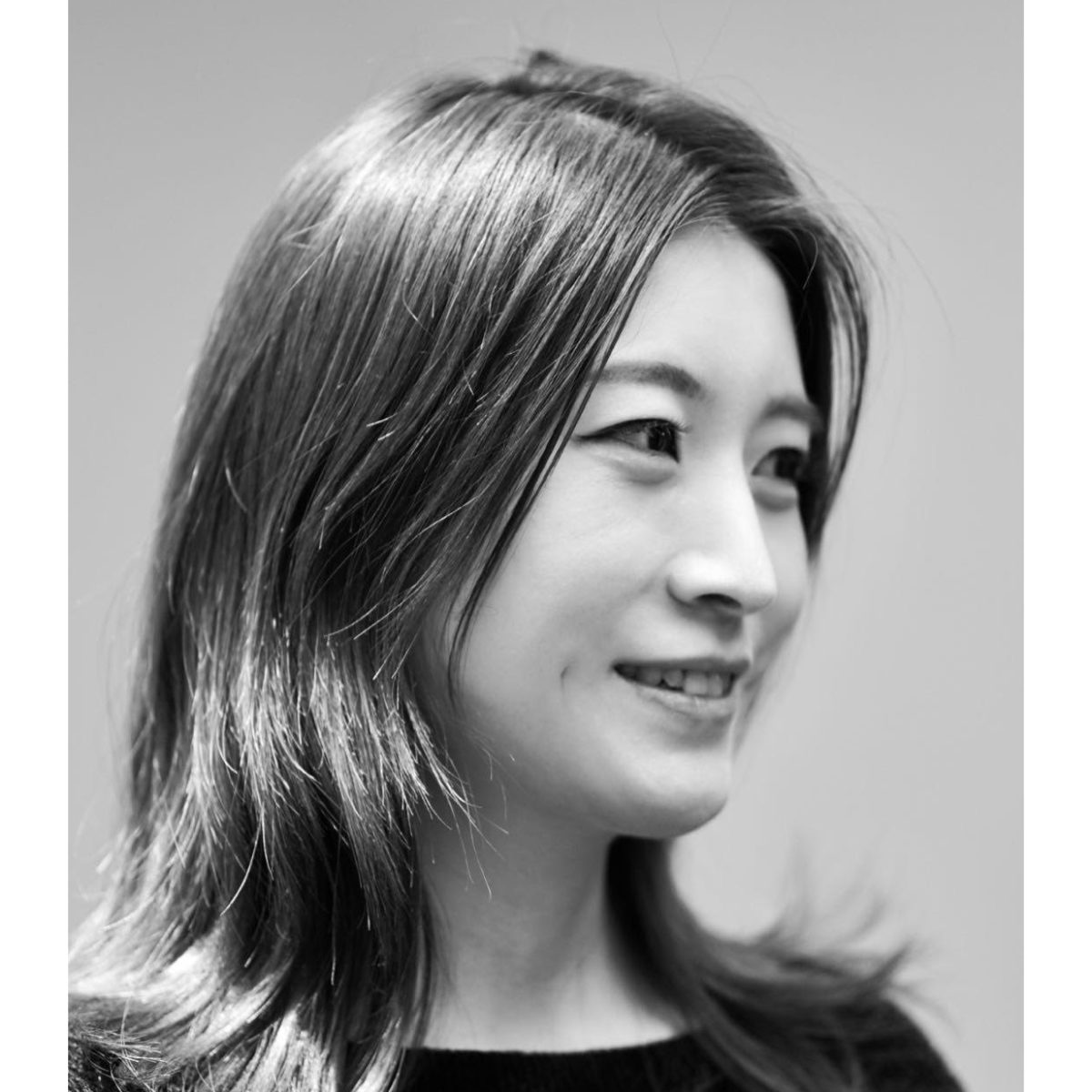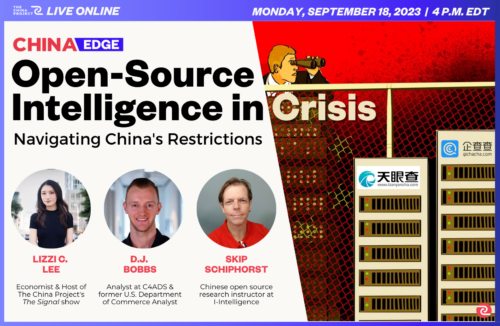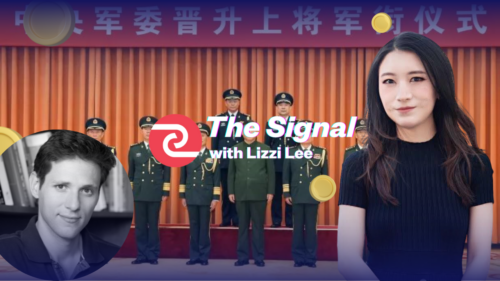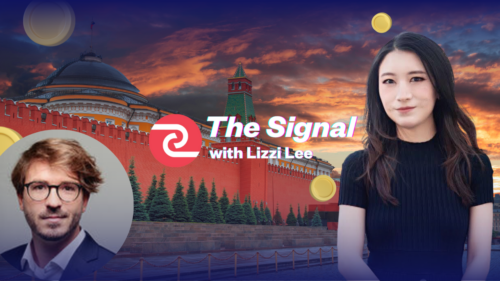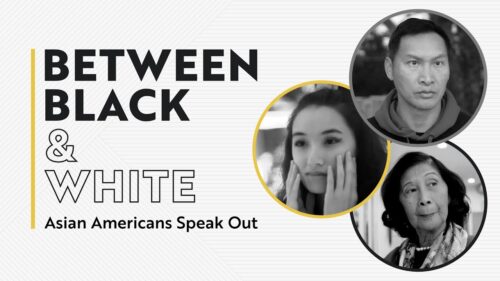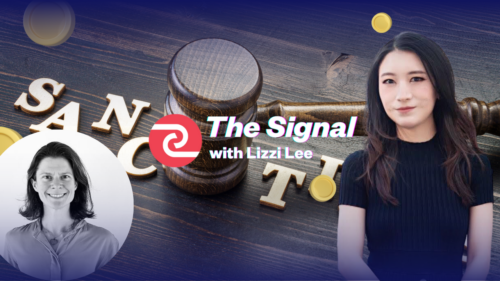Why can’t China tell its own stories well? | The Signal with Lizzi Lee
In this week's episode of The Signal, Lizzi Lee speaks with Harry Harding, also known as Hazza, a journalist, TV presenter, radio host, and singer, previously based in China. He speaks about his experiences in Chinese media, and the state of Chinese media today.

Below is a transcript of the video:
Lizzi: Hello and welcome to this episode of Live with Lizzi Lee powered by The China Project. I’m joined by the great Harry Harding, also known as Hazza, a journalist, TV presenter, radio host, and singer, previously based in China. Hazza, for those in our audience who are not familiar with your story yet, can you give us a sneak peek into your life? How did you become such a rock star anchor at Guangdong TV and what led you to pack your bags and head back to your roots in Australia finally?
Hazza: Yeah, well, I wish I was a rock star, but, you know, I was a presenter for a provincial television and radio network in Guangdong Province, and I really enjoyed it for the longest time. And how I got into that role was really interesting because while I was at university studying Mandarin Chinese, I was posting cover songs to the internet and to Chinese video sharing websites such as Youku and also Weibo, because at the time that was really sort of the most used social media platform in China. Today, I’d say it’s more WeChat. And some of those videos actually went viral and got a few million hits. And, you know, we’re talking about 13, 14 years ago. So those were some quite high numbers at the time. And then so I went for a trip to China after I graduated. And after I graduated, I went for a trip to China and I initially went to Beijing. But the airline that I flew on lost my luggage and it was the middle of winter, so I had no winter clothes. And I looked on a map and said, Where can I go that’s a little bit warmer? And that was Guangzhou.
So I flew down there for a couple of days and a producer from a Guangdong television talk show saw from my Weibo that I was in Guangdong and invited me to be on his show. And so I went there and they interviewed me about my singing. And then after the show was finished, they said to me, Well, we’re looking for a new presenter for our channel. Would you be interested? And so obviously I jumped on that chance. I thought it was a very interesting opportunity, so I went back to Australia for a couple of weeks and so did everything out and packed my bags, and then went back over to Guangzhou to start this new role as a television presenter. And you know, initially my plan was one year or two years, but that, you know, one year after another, it sort of evolved into ten years and then 12 years. So it was the right place at the right time, because, you know, this was at the tail end of the Hu Jintao era.
So the media environment in China at that time was a lot different. Also, the relationship between Australia and China was very good at the time and so it did feel like I was in the right place at the right time. In regards to why I came home, I’d been in China for 12 years, so, you know, in one regard, I felt like that was a full cycle of the Chinese zodiac, you know, 12 years. It’s a good time to to, to close the chapter. Also, I was missing my family, being away from family and friends during COVID, not being able to fly home. It’s not a long flight from Hangzhou to Brisbane. It’s about seven or 8 hours. So I could in the past come home for long weekends and things like that.
But, you know, as relatives get older and you want to spend as much time with them as you can, I thought 12 years was enough. And also things had changed in China, especially in the media environment. Things were changing.
You know, for people who are familiar with China and especially Guangzhou, I think they would understand that the media environment in Guangzhou was always a lot more open than in other parts of China, especially further up north, say, in Beijing. And so for the longest time I felt like I was doing something constructive and something meaningful where I was. But unfortunately, you know, things had changed and that was becoming more and more difficult. So I did have to make the decision and say, you know, for my own well being and mental health, is this really the right path for me to continue on? And I just decided that it wasn’t.So I came back to Australia and I’m now studying a master’s degree in international relations. So so it’s a bit of a change, and I’m still adapting, but that’s basically the gist of it.
Lizzi: Well, fantastic story. What a story. But let’s go back and talk a little bit about Chinese state media. There has been a lot of resources poured into this whole Telling China’s Stories Well mission. But at least to us who live in the West it seems that China’s message is falling flat consistently. As a former insider, what do you think makes Chinese state media struggle to get their media to get their message across to the international audience?
Hazza: Well, I don’t think there’s a simple answer to that. But there are some major components that I can talk about. Firstly, I think that the content just really isn’t relatable to non-Chinese audiences. And I think, you know, for China, they’re really kind of in a bind because as you would know, for a domestic audience, sometimes the messaging can be a little bit different from what the messaging is on platforms for external audiences. But since the Internet has grown so prolific and social media, you know, if Chinese media is facing external, if their messaging is slightly different to domestic messaging, people find that out pretty quickly, whether it be by a whiteboard, whether it be via WeChat.
And so, you know, I think China has kind of made a decision that even in its external messaging, or in media that is externally facing, “well, we’re not really making much traction with international audiences. So it’s important for us to make sure that our external messaging aligns with our domestic messaging, so that we don’t upset the domestic audience.” And also, you know, there are other issues, such as sometimes incidents reported in non-Chinese media that are considered very sensitive within China. And so, you know, for the average Joe, who does have a little bit of interest in China, they may go to Chinese media as their first source because they’re thinking, well, this is something that’s happened in China. I want to know more.
But then when they turn to these Chinese media outlets, sometimes, you know, it’s radio silence. There’s absolutely no discussion. And so that will turn people away as well, because, you know, it makes sense if you want to learn about China to go to Chinese media. But if the Chinese media outlets aren’t facilitating discussion about certain topics that are trending outside of China, then really… people are time-strapped, they’ve got families, they’ve got kids to pick up after school, they’ve got work to go to.
You can’t expect them really to spend half a day, you know, trying to figure out, the truth to a certain issue via perusing all these different outlets. People just want to be able to, in this day and age, go somewhere, get the information that they want and need, and then get on with their lives. And unfortunately, Chinese media sometimes doesn’t do that. I think another issue is what you just mentioned “Telling China’s Stories Well.” And I think for some people it’s a little bit of a confusing concept, because does it mean to tell China’s stories?
Telling China’s stories “Well” as in being factual and comprehensive, or does it mean telling China’s story well so that China is seen in a positive light? Or does it mean telling good China stories? There’s that discussion. And so I think there is some mixed messaging as well, because obviously, from my own personal experience, I know that there are a lot of decent journalists in China doing or trying to do a really good job under the circumstances they’re in.
But unfortunately, it’s difficult for them to really get the information that is needed out there.And one final point is, I think there really is a lack of human stories. I think as people, we all want to know what other people are thinking, what other people are feeling. And it is through that that we relate to people.
As someone who’s lived and worked in China, I can tell you that, the vast majority of the Chinese people that I interacted with are just the same as my friends and family here in Australia. They have the same concerns in life. They want the best for their family, They want the best for their kids. They want a better life tomorrow than they had today. But we don’t see that through Chinese state media. We see a lot of information about statements from the Ministry of Foreign Affairs or the movements of Xi Jinping or, you know, other political leaders. But we don’t hear stories of everyday Chinese people. And, it may just be a story about something that seems mundane, you know, a hobbyist painter, maybe their thing is painting all the different Pokémon!
There are really interesting human stories like that that would relate to Western audiences, but we just don’t hear about it because so much airtime is dedicated to those more political things. And if I can just add one more point… These days, when you tune in to Chinese state media, a lot of airtime and space in publications is dedicated to being highly critical of the West. And so as someone who is from the West or, you know, people in a Western audience, they get that at home. They get that at home through their own media outlets because there is discussion about policies and government and there’s debate. You watch American media and there’s always fierce debate about what’s going on in the US politically. And so people don’t tune in to Chinese media to see that, because they can get that at home. They want to know about China. They want to hear from Chinese people. And Chinese state media just isn’t delivering that. So that is why I think despite the huge investment, you know, in many respects, Chinese state media has failed to gain traction.
Lizzi: Fantastic. Thank you so much for all the insights. Super helpful. I wanted to turn to the so-called “Western media”. I’ve been pondering lately on how we in the West might actually be missing out if we do not truly understand China. But to be honest, our media’s coverage of China can be pretty one dimensional and simplistic as well. What do you think is the biggest story we are sort of ignoring or overlooking when it comes to China? What is this one really important topic that you feel is not getting enough airtime in Western media?
Hazza: Well, I think it goes back to the human story element. I also don’t like the term “Western media” because, in China you always hear about China and the West, but the West is made up of so many different countries, each with different systems, slightly different values, different cultures. Lumping them all together, I think, isn’t constructive. But really, I think that we are missing that human story element. And I have seen some changes here in Australia.
There are some programs that I really enjoy watching, from our public broadcaster. There’s a show every Friday night about China and about Chinese pop culture. And we do get a look into those human stories that I think people crave. They want to see those. I also think there’s an issue where on both sides, both in China and outside of China in the West, in Western media- for want of a better term- both sides tend to focus on the extremes of each side. So in China, you know, you’ll see some anti-U.S. content, which is sort of taking screenshots of commentators that are saying some very outlandish things and very over-the-top things. And then China sort of rebutting that. And then on on the western side, you also see a focus on people in China with very extreme views, very nationalistic views.
And I think that does a disservice to the everyday Chinese person who, you know, like the majority of us just have pretty moderate views on life in general. And so if you are focusing on the extremes of both countries, you don’t get the full picture. And also, I think there is a tendency to play into some of these accounts or commentators in China, because they know that if they’re going to say something very controversial, it’s going to gain traction. And so sometimes I feel as though Western media outlets, they do have the job of this propaganda drive on behalf of China because they are boosting this content. They’re engaging with this content. And if people didn’t react to this, the more controversial stuff that’s coming out of China, that just wouldn’t gain traction. And people might change their approach. I do follow a lot of Chinese journalists on Twitter and I keep in contact with many people via email. There are some journalists that are doing some really amazing work in China. They spend a lot of time doing investigative journalism and putting together some really fascinating content, but it just doesn’t get any attention because it’s not over-sensationalized or it’s not, you know, overly controversial. And so I think if we ignore that content and we might actually be missing some pretty important messaging.
Because I do know that there are some very dedicated journalists in China who are trying to get messages out there, and they may be doing it in a more subtle way. But if we just ignore that totally and focus more on the controversial stuff we might be missing out on, “Hey, what is this story actually trying to say? Why was it framed in this way? Is this something that we should be asking more questions about instead of listening to the likes of the Global Times?” And I think perhaps, if we did refocus our energies on those human stories and try to seek out and engage with people in Chinese media and China in general that do have more moderate views and asking them why and asking their thoughts on things, I think we would have more of a comprehensive view on China.
Lizzi: Fantastic. I wanted to turn to your own life story a little more. I know a few weeks back you actually made headlines when you revealed to an Australian media outlet about some suspicious encounters you had when you were back in China. Basically a couple who you later suspect were connected to the Chinese intelligence approached you with a job offer. I wonder if you can update us a little more on that. What’s what has been happening since then?
Hazza: So obviously, you know, I’m very passionate about engagement with China. So before the story came out and before the segment was aired on television, I was a little bit apprehensive.
I was worried that I might lose a lot of contacts in China. I was worried that people would be upset with me for sharing the story. But surprisingly, you know, the response, the reception was overwhelmingly positive, not just here in Australia, but also in China. And since then, I’ve actually had an opportunity to have some really in-depth conversations with a lot of people from all walks of life, whether they’re Chinese Australians here in China or people back in China.
And it’s just been really humbling and very nice to see that, you know, a lot of people are still willing to keep in touch with me. And most people just expressed empathy, which I thought was really, really nice to see. I think my main message and the main motivation for sharing my story is because I really do think that engagement with China is important. I just think people need to be aware of, you know, what’s out there and what challenges they may face.
Another concern that I have here in Australia is that our foreign interference laws may be a little bit too broad, and I think we really do need to refine them a little bit or provide very detailed sort of guidelines to Australians to say, okay, this is considered illegal, this is okay. Otherwise, at the moment what I’m worried about is Australians going to China and somehow getting involved in something that is considered illegal without them even knowing.
You know, because I was in China for such a long time. I speak the language. And so, I could pick up on the red flags. I knew that this was something that I didn’t want to get involved in. But I just worry people that might be new to China or people that may not have a deep cultural understanding of China or they may not be able to speak the language. If someone comes to you and says, I work for a think tank, I’m really interested in engaging your services.
I mean, being invited by someone who’s claiming they’re from a think tank for a lot of people, that’s a great opportunity. You know, this is great. I’d love to do this. It’ll look good on my resume. I might learn a thing or two, but unfortunately, sometimes, that may not be the case. What I wish for is that Australians will give fellow Australians the benefit of the doubt, especially when Australians are engaging in China. And so I think the way foreign interference laws are at the moment here in Australia, I am just worried that other Australians may get caught up in this without knowing the true nature of what they’re involved in. And I think that prohibits people from actually going out there and experimenting and talking to all different people.
I think that’s a strength of Australians that we go out into the world and we explore and we experience and then we come home and we can share those experiences. But if people are going to China and they have to constantly think in the back of their mind, well, I’ve got to worry about this, and I’ve got to worry about that. That can really be, I guess, restrictive. And so my main message that I would really want to emphasize is that I think we need to rethink some of those foreign interference laws and we need to give Australians the benefit of the doubt and may come forward and tell my story. It was just so that people are aware that this is happening and so people can make informed decisions about who they work with and in what capacity. Because I think it’s great that Australians are still going to China. We need more Australians to understand China so that we can engage with China constructively.
And, you know, I just feel more passionate about being involved in this space in the China Australia space since that article came out, just because the response was so overwhelmingly positive and people were very supportive. And, it just reinforced in me that we’re all just people at the end of the day, you know, we’re all just trying to do the best we can in life. But I will say one thing, which I have been reflecting on since the article came out, because, you know, after the ABC did some investigation, I was able to get more answers than I had before. And, you know, I do feel that it’s a little bit contradictory for China to be detaining a number of Australians in China on espionage charges when, you know, I was working for a Chinese state media outlet and I was approached two times in an attempt for me to engage in espionage. So I think that, it saddens me that Australians are detained in Beijing on charges of espionage when on the other hand, I went through this.
I hope that Australians in China can look after themselves, make smart decisions, but also be confident in what they’re doing. I know that being in China is a huge asset to our country, Australia, and to the world. If we have non-Chinese people or people in the west of Chinese heritage going to China, living and working there, studying the language, it’s an asset and we should appreciate those people for doing that.
Lizzi: Fantastic. Thank you so much. Final question of the day. We don’t get to talk to Xi Jinping in person these days or ever. But if you could sit down with President Xi Jinping himself and actually have a heart-to-heart conversation with him about, you know, the state of media in China, the media environment, which has been deteriorating for a while. What’s your game plan? What would you say to President Xi Jinping?
Hazza: Well, obviously, President Xi Jinping really likes to emphasize the importance of mutual respect and dialog. And I think that makes sense. Dialogue is always important and is always constructive. It’s always good to hear other perspectives and try to find a middle ground. So I think, if I was going into a meeting with Xi Jinping, I would take that strategy, and I would say, I think the way you think about this is great, but let’s apply it to Chinese media as well. Because mutual respect, I think, is important. And part of that is being tolerant to different opinions. I’m under no illusions that, you know, the media landscape in China could change overnight and become more free. But I think some of the restrictions could be relaxed so that it could facilitate some meaningful dialogue. Because I think there is an issue where in China at the moment, a lot of blame is being placed on Western media, foreign media for not telling the Chinese story well. Well, but the fact of the matter is China’s story is China’s to tell. And China should take the opportunity to facilitate some dialogue. I would love to be engaged in some dialogue if it were mutual, if it included the concepts of mutual respect and dialogue because I feel that I have moderate views on China. I feel that I have fair views on China that obviously would include some criticism, but also some praise as well for what China does well.
If China feels as though Western media isn’t doing a good job of representing China fairly, perhaps it should sit down and say, look, this is our story to tell. We have our own platforms. How about we facilitate those discussions? How about, instead of spending so many resources and allocating so much time to being critical of the West, let’s go back to telling China’s story and let’s engage people that know a lot about China. But maybe, they have some varied perspectives, and I think that would be important. And also it has to be win-win as well. So obviously, China always talks about win-win outcomes. And so for someone like me today, if I were to go and accept an interview from a Chinese state media outlet, for me, I don’t think it would be a win-win situation because I would be concerned that my responses would be edited. Any criticism would be cut out and then that would basically tell the world that I don’t have a nuanced view on China, that I don’t have a fair and balanced perspective on China. So that would be a win-lose situation. A Chinese state media would win because they would have those comments praising China. But I would lose because that would damage my reputation.
It’s going to be tough. But and this is, you know, another thing Xi talks about is dual circulation in the economy where, you know, they’re trying to boost domestic consumption while also engaging with the international market. So perhaps Chinese media could also have a dual circulation mode where there is more separation between the domestic platforms and the foreign-facing platforms. And then at least on those foreign-facing platforms, if you do want to have a voice heard around the world from China, you know, really you need to be able to engage people in meaningful discussions. You need to have debates, need to have some content that is critical of what China doesn’t get right, because everywhere else we look, whether it be Fox News or whether it be CNN or whether it be Sky News, all of these different channels, they always have debates and obviously they have their own slant on everything. But there are debates and, you know, there is criticism of people and politicians and policies and whatever it is. So it’s hard for an audience that is used to that to turn on something like CGTN and see none of that.
I guess I would just say to Xi Jinping that you can tell China’s story well without omitting parts of the story or without ignoring parts of the story. And in fact, the story would probably be told much better if you did allow more of a comprehensive view of China. And it might it may be a risk. It may be risky to start doing that. But if you really do want to make sure that your own platforms are engaging and are appealing to a Western audience, then perhaps allowing some more discourse with some more room for disagreement would be a good start.
